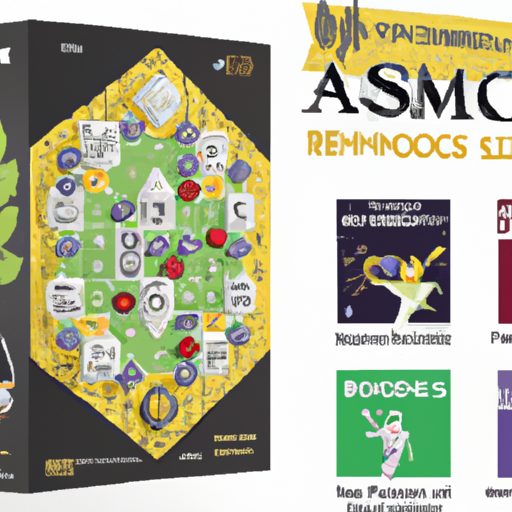What Are 5 Characteristics Of Games? Enthralling Edge of Your Seat Fun
In this article, we will explore the fascinating world of games and delve into the five key characteristics that define them. Games have been a beloved form of entertainment for centuries, captivating both young and old alike. Whether you’re a seasoned gamer or new to the gaming scene, understanding these fundamental characteristics will help you appreciate the intricacies and appeal of this immersive pastime. So, let’s dive in and explore the question, “What Are 5 Characteristics Of Games?” and the defining traits that make games so engaging and enjoyable.
What Are 5 Characteristics Of Games: Goals
Clear objectives
One of the key characteristics of games is that they provide clear objectives for the players to achieve. These objectives act as targets or goals that guide the gameplay and give players a sense of purpose. Clear objectives help to motivate players and give them a sense of direction, allowing them to focus their efforts and make strategic decisions in order to achieve those goals.
Winning conditions
In addition to clear objectives, games also have defined winning conditions. These conditions determine what it takes for a player to be declared the winner of the game. Winning conditions can vary depending on the type of game, but they often involve reaching a certain score, being the first to achieve a specific task, or outperforming other players in some way. Having winning conditions adds a competitive element to games and allows players to strive for success and victory.
Achievements and rewards
Games often incorporate a system of achievements and rewards to provide additional motivation and satisfaction for players. Achievements are specific goals or milestones within the game that players can work towards. These achievements may range from completing a difficult puzzle to defeating a powerful enemy. When players accomplish these achievements, they are usually rewarded with in-game rewards such as points, items, or special abilities. This system of achievements and rewards helps to create a sense of progression and accomplishment, giving players a sense of satisfaction and fulfillment.
What Are 5 Characteristics Of Games: Rules
Set of established regulations
Games have a set of established regulations or rules that govern how they are played. These rules define the boundaries and limitations of the game, and they ensure that all players are playing by the same guidelines. Rules can cover a wide range of aspects, such as how different game mechanics work, what actions are allowed or prohibited, and how players interact with each other and the game world. Having a set of established regulations helps to create a fair and consistent playing field for all players, ensuring that everyone is playing on an equal footing.
Limits and boundaries
In addition to regulations, games also have limits and boundaries that players must adhere to. These limits can include things like time limits, resource limits, or movement limits. By placing these constraints on players, games create challenges and force players to make strategic decisions within those limitations. Limits and boundaries add an element of difficulty and encourage players to think creatively and strategically to overcome obstacles and achieve their goals.
Consistency and fairness
Games strive to be consistent and fair in order to provide a level playing field for all players. Consistency ensures that the game mechanics and rules are applied uniformly, allowing players to understand and predict how the game will behave. This consistency allows players to develop strategies and make informed decisions based on their understanding of the game’s mechanics.
Fairness, on the other hand, ensures that all players have an equal opportunity to succeed and win. This can be achieved through balancing mechanisms, such as matching players of similar skill levels or providing opportunities for players to catch up if they fall behind. Consistency and fairness are important aspects of games as they contribute to a positive and enjoyable gaming experience.

What Are 5 Characteristics Of Games: Interactivity
Active participation
One of the defining characteristics of games is interactivity, which requires active participation from players. Unlike passive forms of entertainment like watching a movie or reading a book, games require players to engage with the game world and actively manipulate the game mechanics to progress. This active participation can involve a wide range of actions, such as making decisions, solving puzzles, completing challenges, or controlling characters. Active participation is what sets games apart and makes them an immersive and engaging form of entertainment.
Player agency
Games also provide players with a sense of agency, giving them control and influence over the outcome of the game. Player agency refers to the ability of players to make meaningful choices that have consequences within the game world. These choices can vary from simple decisions like which path to take, to more complex choices that affect the storyline or the behavior of other characters within the game. Player agency not only allows players to shape their own experience but also adds a sense of autonomy and personal investment in the game.
Choices and consequences
Building on the concept of player agency, games frequently present players with choices and consequences. These choices can have both immediate and long-term consequences, impacting the gameplay, the narrative, or the relationships between characters. Choices and consequences provide players with a sense of ownership and impact, allowing them to shape the direction of the game and experience different outcomes based on their decisions. This element of interactivity and decision-making adds depth and replayability to games, as players can choose different paths and see how their choices affect the game world.
What Are 5 Characteristics Of Games: Challenge
Difficulty levels
Games often incorporate different difficulty levels to cater to players of varying skill levels and preferences. Difficulty levels determine the level of challenge that players will face within the game. Higher difficulty levels typically involve tougher enemies, more complex puzzles, or stricter time constraints, while lower difficulty levels may offer more forgiving gameplay or provide assistance to players. The inclusion of difficulty levels allows games to be accessible to a wider range of players, ensuring that both casual and hardcore gamers can find an appropriate level of challenge.
Overcoming obstacles
Challenge is an inherent part of games, and overcoming obstacles is a central aspect of gameplay. These obstacles can take many forms, such as physical barriers, enemies to defeat, or puzzles to solve. Overcoming these obstacles often requires a combination of skill, strategy, and problem-solving abilities. Players must analyze the situation, develop a plan, and execute it effectively in order to overcome the challenges that the game presents. The act of overcoming obstacles provides a sense of achievement and fulfillment, as players are rewarded for their efforts and progress further in the game.
Problem-solving
Games frequently require players to engage in problem-solving to progress. Whether it’s finding a hidden key, deciphering a complex code, or strategizing to defeat a tough enemy, problem-solving is a fundamental aspect of gameplay. Games challenge players to think critically, analyze information, and come up with creative solutions to overcome obstacles.
Problem-solving not only exercises players’ cognitive skills but also provides a sense of satisfaction and accomplishment when they successfully solve a challenging puzzle or overcome a difficult obstacle.

What Are 5 Characteristics Of Games: Competition
Opponents and rivals
Competition is a key element in many games and often involves facing off against opponents or rivals. These opponents can be computer-controlled characters or other players in multiplayer games. The presence of opponents adds an extra layer of challenge and excitement to games, as players must outperform their rivals in order to achieve victory. The behavior and skill of opponents can vary, providing varying degrees of challenge and keeping players engaged and motivated to improve their own performance.
Scoring and leaderboards
Games frequently incorporate scoring systems and leaderboards to track and compare player performance. Scoring systems assign points or ratings based on various criteria, such as completing objectives, defeating enemies, or achieving certain milestones. Leaderboards display the rankings of players based on their scores, allowing players to compare their performance against others and strive for higher standings. The inclusion of scoring and leaderboards adds a competitive element to games, encouraging players to improve their skills and achieve higher scores.
Comparative performance
In addition to leaderboards, games often provide opportunities for players to compare their performance against others. This can include features such as replays of other players’ gameplay, ghost data that mimics other players’ actions, or online matches where players can compete directly against each other. By allowing players to measure their performance against others, games foster a sense of competition and provide additional motivation for players to improve and strive for excellence.
What Are 5 Characteristics Of Games: Feedback
Immediate response
Games provide immediate feedback to players, letting them know the consequences of their actions and allowing them to adjust their strategies accordingly. This feedback can take many forms, such as visual cues, auditory signals, or on-screen indicators. Immediate response is essential in games as it helps players understand how their actions affect the game world, providing them with valuable information to make informed decisions and adapt their gameplay.
Information about progress
In addition to immediate feedback, games also provide players with information about their progress in the game. This can include things like level completion percentages, experience points accumulated, or items collected. This information allows players to track their progress, set goals, and measure their performance within the game. By providing information about progress, games give players a sense of accomplishment and motivate them to continue playing.
Guidance and evaluation
Games often offer guidance and evaluation to help players improve their performance and make better decisions. This can come in the form of in-game tutorials, hints, or tips that provide players with guidance on how to overcome challenges or play more effectively. Evaluation can also occur at the end of levels or sections, where players receive feedback on their performance and suggestions for improvement. By providing guidance and evaluation, games support players’ learning and growth, helping them become more skilled and knowledgeable.

What Are 5 Characteristics Of Games: Immersion
Engaging storyline
Many games incorporate an engaging storyline or narrative that hooks players and keeps them invested in the game world. The storyline can unfold through cutscenes, dialogues, or in-game events, providing players with context and motivation for their actions. Engaging storylines often involve interesting characters, intriguing plot twists, and compelling conflicts that capture players’ attention and make them feel emotionally connected to the game. A strong storyline adds depth and immersion to games, making them more than just a series of actions or challenges.
Believable virtual world
Games strive to create believable virtual worlds that players can immerse themselves in. These worlds are often richly detailed, with realistic or stylized graphics, immersive sound design, and interactive elements. By creating a believable virtual world, games transport players to new and exciting places, allowing them to explore and interact with the environment. Believable virtual worlds contribute to the overall immersion and enjoyment of games, as players can feel like they are truly part of the game world.
Emotional attachment
Another aspect of immersion in games is the emotional attachment that players can develop towards the game and its characters. Through compelling storytelling, well-developed characters, and impactful moments, games have the power to evoke various emotions in players. Players may feel joy when they achieve a difficult task, frustration when facing a tough challenge, or empathy for the plight of a character. Emotional attachment adds depth and resonance to games, making them a truly immersive and memorable experience.
What Are 5 Characteristics Of Games: Social Interaction
Multiplayer features
Many games offer multiplayer features that allow players to interact and play together. These features can range from cooperative gameplay, where players work together towards a common goal, to competitive gameplay, where players face off against each other.
Multiplayer features can be local, where players are in the same physical location, or online, where players can connect and play with others from around the world. By incorporating multiplayer features, games foster social interaction, encourage teamwork, and provide opportunities for players to engage with others.
Cooperative or competitive play
Games often offer options for cooperative or competitive play, allowing players to choose how they want to interact with others. Cooperative play involves working together towards a shared goal, with players combining their skills and abilities to overcome challenges. Competitive play, on the other hand, pits players against each other in a battle for victory or dominance. Both cooperative and competitive play provide unique social experiences, allowing players to collaborate or compete with others and enhance the overall enjoyment of the game.
Communication and cooperation
Social interaction in games is facilitated through communication and cooperation between players. Games often provide communication tools such as chat functions or voice chat, allowing players to communicate with each other during gameplay. Communication is essential for cooperative play, as players need to coordinate their actions and share information to achieve their objectives. Cooperation and communication in games can foster teamwork, build relationships between players, and create a sense of community within the game.

What Are 5 Characteristics Of Games: Variability
Different outcomes and possibilities
One of the key aspects of games is the presence of different outcomes and possibilities. Games often offer multiple paths or choices that can lead to different outcomes or endings. These different outcomes can be determined by players’ decisions, their performance, or the result of random events. The presence of different outcomes and possibilities adds replayability to games, as players can explore different paths and choices to see how they impact the game’s narrative or gameplay.
Randomness or strategic choices
Games can incorporate elements of randomness or strategic choices that further enhance their variability. Randomness can come in the form of random events or occurrences that players must adapt to and overcome. Randomness adds an element of unpredictability and surprise to games, keeping players engaged and challenged. Strategic choices, on the other hand, allow players to make decisions that affect the outcome of the game. These choices can involve resource management, tactical positioning, or long-term planning, adding depth and complexity to the gameplay.
Replayability
The combination of different outcomes, possibilities, and variability in games often leads to high replayability. Replayability refers to the desire or ability to play a game multiple times without losing interest. Games that offer different paths, choices, or challenges each time they are played provide a fresh and engaging experience with each playthrough. Replayability is a desired characteristic of games as it extends their lifespan and ensures continued enjoyment for players.
What Are 5 Characteristics Of Games: Enjoyment
Fun and entertainment
At its core, games are created to provide fun and entertainment to players. Games are designed to be enjoyable, engaging, and provide a source of entertainment and relaxation. Through their gameplay, mechanics, and overall design, games aim to create a positive and enjoyable experience that captivates players and keeps them coming back for more. Players often seek out games that are fun and entertaining, as they provide a break from reality and an opportunity to immerse themselves in a different world.
Positive emotions
Games have the ability to evoke a wide range of positive emotions in players. Whether it’s the satisfaction of overcoming a challenge, the excitement of achieving a high score, or the joy of experiencing a captivating story, games can elicit positive emotions that contribute to a sense of enjoyment and fulfillment. Positive emotions experienced during gameplay can have a lasting impact, creating lasting memories and fostering a sense of happiness and well-being.
Satisfying experience
Ultimately, games aim to provide a satisfying experience for players. This satisfaction can come from achieving goals, overcoming challenges, or experiencing a well-crafted narrative. A satisfying experience in games often involves a sense of accomplishment, where players feel rewarded for their efforts and progress. Games that provide a satisfying experience leave players with a positive impression and a desire to continue playing, ensuring their enjoyment and long-term engagement with the game.
Conclusion: What Are 5 Characteristics Of Games
As we’ve explored in this article, understanding the characteristics of games is much like dissecting the elements that make a good story. From rules and objectives to competition and strategy, each characteristic serves as a building block that transforms a simple activity into an engaging game. So, when considering what are 5 characteristics of games, it’s crucial to recognize that these traits collectively shape the player’s experience, influencing not only the enjoyment factor but also the game’s potential for social interaction and skill development.
Rules and Objectives
Rules and objectives set the stage, defining the “what” and “how” of gameplay. They are the framework that guides players, giving them goals to achieve and constraints that challenge their skills. Without clear rules and objectives, a game loses its structure and turns into mere aimless interaction.
Competition
Competition serves as the fuel for engagement, driving players to strive for victory. Whether it’s competing against oneself, an AI, or other players, the competitive aspect adds a layer of emotional investment that elevates the game from a simple pastime to a captivating experience.
Strategy and Skill
The elements of strategy and skill transform a game from a gamble of luck to a test of aptitude. These features invite players to think critically, plan ahead, and adapt—skills that are not only rewarding within the game but also applicable in real life.
Social Interaction
Games often serve as social catalysts, whether they are multiplayer online games or old-school board games. The social component enriches the gaming experience, creating opportunities for teamwork, communication, and even the formation of friendships and communities.
Entertainment Value
Last but not least, the entertainment value is what keeps players coming back. Whether it’s through compelling storytelling, stunning graphics, or just the sheer fun of gameplay, the entertainment aspect is the lifeblood that sustains a game’s longevity and appeal.
In summary, the 5 characteristics of games—rules and objectives, competition, strategy and skill, social interaction, and entertainment value—are interconnected elements that define what a game is and what it can offer to its players. Recognizing these characteristics is essential for both players seeking a game that suits their interests and developers aiming to create games that resonate with audiences.




